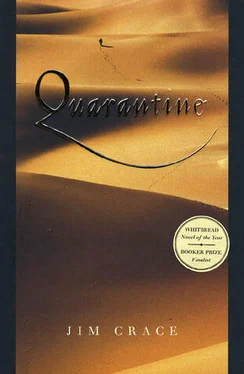Jim Crace - Quarantine
Здесь есть возможность читать онлайн «Jim Crace - Quarantine» весь текст электронной книги совершенно бесплатно (целиком полную версию без сокращений). В некоторых случаях можно слушать аудио, скачать через торрент в формате fb2 и присутствует краткое содержание. Год выпуска: 1998, Издательство: Straus and Giroux, Жанр: Современная проза, на английском языке. Описание произведения, (предисловие) а так же отзывы посетителей доступны на портале библиотеки ЛибКат.
- Название:Quarantine
- Автор:
- Издательство:Straus and Giroux
- Жанр:
- Год:1998
- ISBN:нет данных
- Рейтинг книги:4 / 5. Голосов: 1
-
Избранное:Добавить в избранное
- Отзывы:
-
Ваша оценка:
- 80
- 1
- 2
- 3
- 4
- 5
Quarantine: краткое содержание, описание и аннотация
Предлагаем к чтению аннотацию, описание, краткое содержание или предисловие (зависит от того, что написал сам автор книги «Quarantine»). Если вы не нашли необходимую информацию о книге — напишите в комментариях, мы постараемся отыскать её.
Quarantine
Quarantine — читать онлайн бесплатно полную книгу (весь текст) целиком
Ниже представлен текст книги, разбитый по страницам. Система сохранения места последней прочитанной страницы, позволяет с удобством читать онлайн бесплатно книгу «Quarantine», без необходимости каждый раз заново искать на чём Вы остановились. Поставьте закладку, и сможете в любой момент перейти на страницу, на которой закончили чтение.
Интервал:
Закладка:
It would suit Musa if he never saw the woman again. He was angry with her. She had not been sensible. Ifshe’d had any brains she would have packed her few belongings and set off home already, saving trouble and embarrassment for everyone. But Miri had searched inside the cave and Marta’s clothes were still there. A woman would not leave without her spare clothes. So she was either hiding in the scrub, or something bad had happened to her. Something fatal, Musa hoped. She brought these problems on herself If she were dead, they’d have to hold a double burial, the Gaily and the woman in one grave. She could be a handmaiden for Jesus for eternity. An honour, actually. Too good for her. But if she were stil alive, then the very sight of her would spoil the Gaily’s funeral. Musa wanted to despatch the healer with proper, blameless piety. He did not want his little sins to stand as mourners at his side.
‘You cannot send him to his maker without a sacrifice,’ said Musa, breaking his own silence. ‘Come on, come on. What will you do for him?’
‘What kind ofsacrifice?’ asked Shim. Was this to be a sacrifice ofprinciple or dignity or money? He was running short, although he still had some coins hidden in his cloak, and didn’t want to part with any.
‘What do these people sacrifice? Their daughters, probably. Some animal, then. We have to spill a little blood for the man, to wet our funeral prayers. That’s how it’s done in the Galilee. They take an ox and slit its throat.’
‘Regrettably, I cannot lead you to an ox,’ said Shim, much relieved. ‘I haven’t noticed any oxen hereabouts. .’
‘There are your goats,’ said Aphas helpfully. ‘^Kil one. It would be generous.’
‘Wasteful, too,’ said Musa. ‘And only generous for me. What would be your part in it?’ He would not agree to sacrificing merchandise, not even for the Gaily. Goats provided milk and meat and fuel and skin. Killing one without a proper purpose would be a four-fold waste. ‘Send him,’ he lifted his chin towards the badu. ‘He’s the hunter, isn’t he? He’s already poached enough birds and deer from off my land. Send him to catch something for us. I think I can afford him that.’
Musa threw a stone at the badu to draw his attention. ‘Explain what we want,’ he said to Aphas. ‘He’s used to you.’ He watched the old man mime the catching and the slaughter of an animal. The badu did not seem to understand. He grinned and shook his head, until Musa took his ornamental knife out of its cloth and made a motion with its blade across his throat, followed by the hand-sign for a prayer. Then the badu nodded. ‘See, he’s not as stupid as he looks,’ said Musa. ‘How could he be?’
The badu hurried off towards the valey. He’d almost understood. He was to catch a bird for Jesus. The smalest funeral offering. He had mistaken Musa’s praying hand-sign to be a bird, the fingers pressed together like closed wings, the thumbs protruding like a little head. The badu knew exactly what to do. Catching birds was easy. He’d been doing it for years.
He ran down to the tent and hunted through the goatskins until he found Miri’s cooking chest. He popped a little cube of hard salt between his lips, and unravelled a fraying length of green cotton thread from one of Musa’s ruined samples. He wrapped the thread around his finger and tiptoed amongst the goats, which had been let loose to graze on the tattered fabrics and any food that they could find. To anyone that watched it would seem that he was whispering in their ears, more evidence of lunacy. A madman speaking to the goats. What did he want with them? To tether them with his thin thread? To strangle one of the goats for Jesus, perhaps?
The badu searched the goats until he found one with a blood- fi.lled tick in the skin folds of an ear. Easy to see, but not so easy to get out. Some smoke, blown from a burning stick, would usually make a tick detach itself. But the badu hadn’t any smoke. Instead he took the now softened cube of salt out of his mouth. He crumbled it into the goat’s ear and rubbed it into the skin. Salt was better than smoke for catching ticks. A goat with a burning ear would not stay still. The tick, however, hated salt. It contracted, darkened, and fell into the badu’s palm. That was the easy part.
The hard part was to tie the thread around the tick’s abdomen without popping its blood sac, and without the tick attaching itselfto the badu’s finger. But he was practised. He had harnessed hundreds of ticks since he was small. He could have pulled a chariot with them.
The badu took the fastened tick into the nearest stand of thorns. What little rain there’d been in the night had tempted last year’s seeds to hazard their first green shoots. Insects, tempted by the moisture and the exposed sap of wind-snapped branches, competed for a meal. So did the birds. Finches, wheatears, warblers had come from nowhere to gorge themselves. And there were circling hawks, of course, waiting for the plumpest opportunity.
The badu put his tick on an exposed flat rock amongst the bushes, a little grape of blood, and weighed the thread down with a stone, a finger-length from the tick. It could not wiggle away, out of the unforgiving light. It couldn’t even fall very far, but it hadjust freedom enough to advertise itselfwith its struggles. It didn’t like the thread around its abdomen; it didn’t like the sun. The badu backed away, downwind, running the remainder of the thread through his fingers, until he found a hiding place behind a bush where he could not be seen but from where the twisting tick was visible. Now he would fish himself a bird.
He was an expert at keeping still, though anyone who’d seen him in the past thirty days, running in the rocks, tugging his hair and hands unceasingly, would have been amazed that one so plagued by movement and loose limbs could be so quiet and patient when it suited him. Perhaps the truth was this: he was a madman only when observed, the cussed opposite of those who conspired to be rational in company and cultivate their manias alone. The badu, without any witnesses to click their tongues at him and shake their heads, appeared entirely sane. He crouched beneath a thorn bush in the scrub, a blood tick offered on a thread to passing birds. And he was happy, too. He had his plans. He’d do his duty to the Gaily who had died, and then he’d make a rich man of himself
It wasn’t long before a banded wheatear came, a male, on its way north to breed. For al its mating splendour, its damask eye plumes and its black flights, it was tired from its long journey, and glad to have such easy and nourishing prey. The trick, it knew, was not to peck the tick. The bulb ofblood would burst.
Instead, the wheatear turned its head and took the tick whole. It lifted up its head to let the feast fall into its crop.
The trick for the badu was to wait. Ifhe pulled on the thread too soon, before the wheatear’s throat had ended its spasm of swallowing, the tick would pop out of its mouth again, without the blood. If he puiled on the thread too late, the wheatear’s flight might be strong enough to snap the cotton. The badu waited until the wheatear spread its wings, two beats, and then he jerked the thread. The wheatear tumbled in the air, and fell on to its back. The badu was already there. The bird was his. Not quite the perfect sacrifice, of course. Not quite as generous as a goat, not quite as heavy as an ox. But better than no sacrifice at aH.
The badu only broke one wing so that the wheatear could not fly away. He held it, quivering, in both hands. It didn’t peck at him for long. Only its trembling chest showed that it was still alive. He snapped the thread off at its beak and carried the bird to the men, waiting at the grave. They were disappointed. They had hoped that he would catch a little deer at least.
Читать дальшеИнтервал:
Закладка:
Похожие книги на «Quarantine»
Представляем Вашему вниманию похожие книги на «Quarantine» списком для выбора. Мы отобрали схожую по названию и смыслу литературу в надежде предоставить читателям больше вариантов отыскать новые, интересные, ещё непрочитанные произведения.
Обсуждение, отзывы о книге «Quarantine» и просто собственные мнения читателей. Оставьте ваши комментарии, напишите, что Вы думаете о произведении, его смысле или главных героях. Укажите что конкретно понравилось, а что нет, и почему Вы так считаете.












